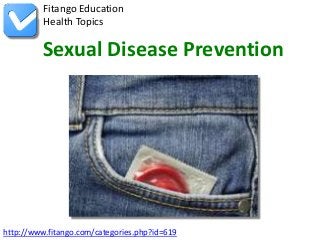
Sexual Disease Prevention
- 1. http://www.fitango.com/categories.php?id=619 Fitango Education Health Topics Sexual Disease Prevention
- 2. 1 Overview The most reliable ways to avoid becoming infected with or transmitting STDs are: -- Abstain from sexual intercourse (i.e., oral, vaginal, or anal sex). -- Be in a long-term, mutually monogamous relationship with an uninfected partner
- 3. 2 Overview Latex male condoms, when used consistently and correctly, can reduce the risk of transmission of chlamydia, gonorrhea and trichomoniasis.
- 4. 3 Reducing Your Risk All partners should get tested for HIV and other STDs before initiating sexual intercourse. However, if you decide to be sexually active with a partner whose infection status is unknown or who is infected with HIV or another STD, you can reduce your risk of contracting an STD:
- 5. 4 Reducing Your Risk Ask a new sex partner if he or she has an STD, has been exposed to one, or has any unexplained physical symptoms. Do not have unprotected sex if your partner has signs or symptoms of STDs, such as sores, rashes, or discharge from the genital area. Many common STDs have no symptoms but can still be transmitted to a sexual partner. If your partner has had sexual relations with someone else recently, he or she may have an STD, even if there are no symptoms.
- 6. 5 Reducing Your Risk Use a new condom for each act of insertive intercourse. Correct and consistent use of latex condoms and other barriers can reduce the risk of transmission only when the infected area or site of potential exposure is protected.
- 7. 6 Reducing Your Risk Get regular checkups for STDs (even if you show no symptoms), and be familiar with the common symptoms. Most STDs are readily treated, and the earlier treatment is sought and sex partners are notified, the less likely the disease will do irreparable damage.